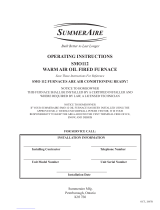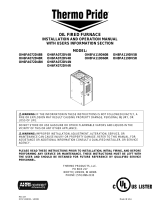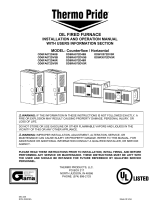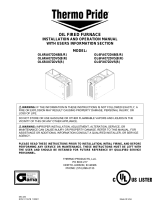
All installations and services must be performed by qualified service personnel.
13
C. INSPECTION AREAS
VESTIBULE: The furnace vestibule area or burner compartment should be inspected by removing the front door of
the furnace and looking for signs of excessive heat such as discoloration of components materials damage, from rust
or corrosion, soot or carbon build-up.
EXTERIOR OF FURNACE: The furnace exterior should be inspected for signs of excessive heat such as
discoloration of materials and damage from rust or corrosion.
FLUE PIPE, VENT PIPE OR CONNECTOR: The furnace vent pipe should be inspected for signs of rust,
corrosion pitting or holes in pipe, and leakage around seams in pipe, indicated by soot or condensate streaks.
CHIMNEY OR VENTING SYSTEM: The furnace venting system should be inspected for signs of rust, corrosion
pitting or holes, and signs of condensation or moisture leakage from the venting system.
If any of the above symptoms are evident, call a qualified heating contractor for assistance.
?
??
?CAUTION: DO NOT ATTEMPT TO MAKE REPAIRS YOURSELF!
?
??
?WARNING: The area around the furnace should be kept free and clear of combustible
liquids and material, especially papers and rags.
?
??
?WARNING: NEVER burn garbage or refuse in your furnace. Never try to ignite oil by
tossing burning papers or other material into your furnace.
?
??
?WARNING: Thermo Pride oil furnaces are designed to burn No. 1 or No. 2 distilate fuel
oil. NEVER USE GASOLINE OR A MIXTURE OF OIL AND GASOLINE.
?
??
?CAUTION: DO NOT ATTEMPT TO START THE BURNER WHEN:
1. Excess oil has accumulated,
2. The furnace is full of vapors
3. The combustion chamber is very hot.
IF ONE OR MORE OF THESE CONDITIONS EXIST, CONTACT A QUALIFIED
SERVICE PERSON.
D. STARTING THE BURNER:
1. Turn the main service switch to "OFF" position.
2. Set thermostat substantially above room temperature.
3. Open shut-off valves in oil supply line to burner.
4. Turn service switch to furnace "ON". If burner starts and runs, but stops again on lockout, it may be necessary to
bleed the lines or make burner combustion air adjustments. Contact a qualified service person to adjust and start
burner.
E. FILTER CLEANING AND LOCATION:
The air filters should be inspected each month and cleaned when dirty. Cleaning the air filters frequently may reduce
airborne contaminants from entering the furnace and depositing in the furnace, duct system and home.
?
??
?WARNING: To avoid injury from moving parts, hot surfaces, or electrical shock, shut
off the power to the furnace before removing any furnace access doors to service the air
filters.
OL Series (Lowboy)
To clean a dirty filter, first remove the blower compartment door at the rear of the furnace, refer to figure
17. Remove the dirty filter from the filter rack and clean it with a mild soap and water solution. Make sure filter is
thoroughly dry before replacing. Replace the blower compartment door.


























